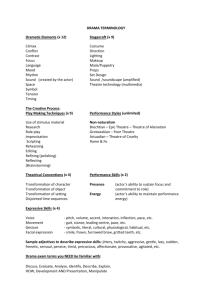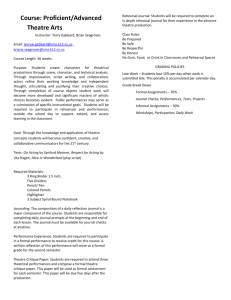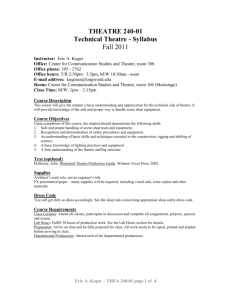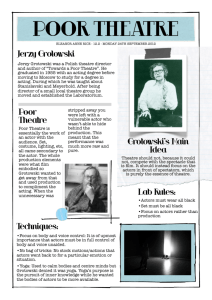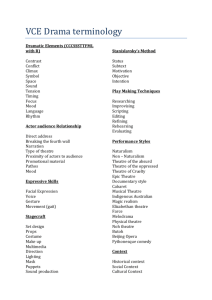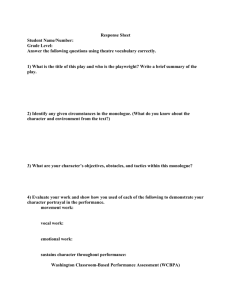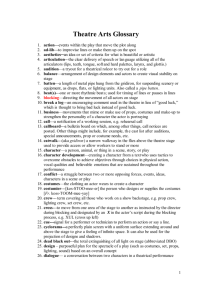Course Number 1111 - Portland Public Schools
advertisement
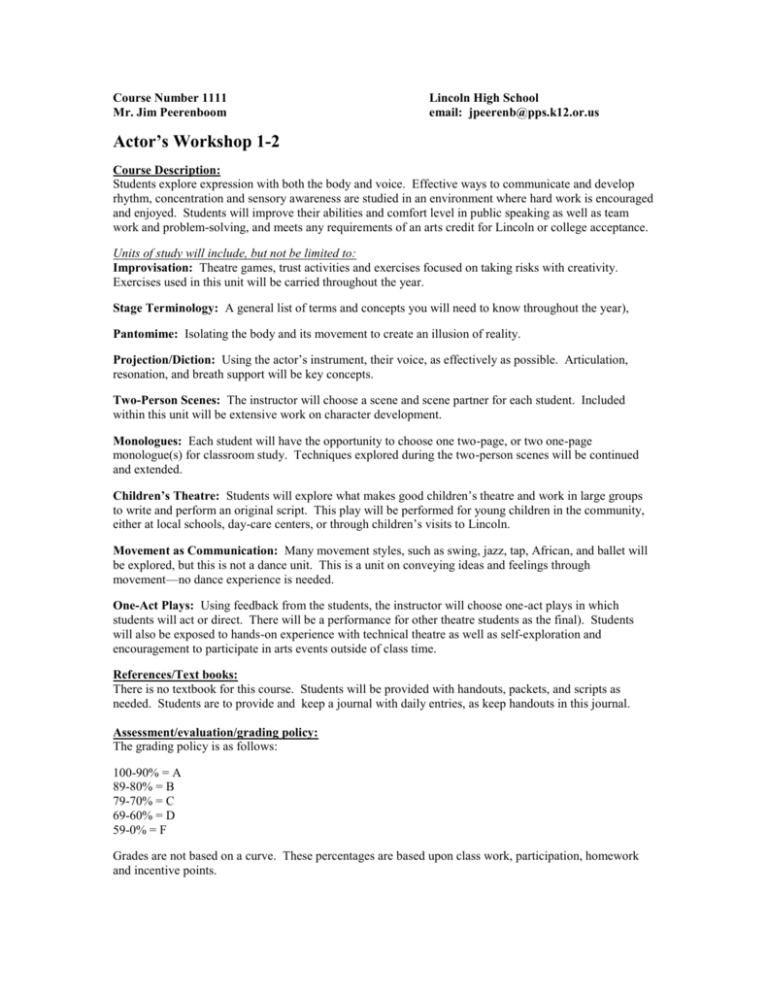
Course Number 1111 Mr. Jim Peerenboom Lincoln High School email: jpeerenb@pps.k12.or.us Actor’s Workshop 1-2 Course Description: Students explore expression with both the body and voice. Effective ways to communicate and develop rhythm, concentration and sensory awareness are studied in an environment where hard work is encouraged and enjoyed. Students will improve their abilities and comfort level in public speaking as well as team work and problem-solving, and meets any requirements of an arts credit for Lincoln or college acceptance. Units of study will include, but not be limited to: Improvisation: Theatre games, trust activities and exercises focused on taking risks with creativity. Exercises used in this unit will be carried throughout the year. Stage Terminology: A general list of terms and concepts you will need to know throughout the year), Pantomime: Isolating the body and its movement to create an illusion of reality. Projection/Diction: Using the actor’s instrument, their voice, as effectively as possible. Articulation, resonation, and breath support will be key concepts. Two-Person Scenes: The instructor will choose a scene and scene partner for each student. Included within this unit will be extensive work on character development. Monologues: Each student will have the opportunity to choose one two-page, or two one-page monologue(s) for classroom study. Techniques explored during the two-person scenes will be continued and extended. Children’s Theatre: Students will explore what makes good children’s theatre and work in large groups to write and perform an original script. This play will be performed for young children in the community, either at local schools, day-care centers, or through children’s visits to Lincoln. Movement as Communication: Many movement styles, such as swing, jazz, tap, African, and ballet will be explored, but this is not a dance unit. This is a unit on conveying ideas and feelings through movement—no dance experience is needed. One-Act Plays: Using feedback from the students, the instructor will choose one-act plays in which students will act or direct. There will be a performance for other theatre students as the final). Students will also be exposed to hands-on experience with technical theatre as well as self-exploration and encouragement to participate in arts events outside of class time. References/Text books: There is no textbook for this course. Students will be provided with handouts, packets, and scripts as needed. Students are to provide and keep a journal with daily entries, as keep handouts in this journal. Assessment/evaluation/grading policy: The grading policy is as follows: 100-90% = A 89-80% = B 79-70% = C 69-60% = D 59-0% = F Grades are not based on a curve. These percentages are based upon class work, participation, homework and incentive points. Student opportunities to meet CIM/CAM/PASS/CRLS/CRLE requirements: Taking Actor’s Workshop will meet all requirements of the above mentioned programs (example: personal management, problem solving, communication, teamwork, employment foundations et cetera). Additional costs/materials: Students will need to provide a three-ring binder with paper/dividers that can be used as an actor’s journal during the course of the class. This should be separate from notebooks used in other classes, as it will be turned in each week. In addition, field trip opportunities may arise to see local performances at a discounted rate. Some financial assistance is available to those students who cannot afford to attend these performances. If such an opportunity should arise, students will be given advance notice. Behavioral expectations: Please sit within the first four rows of seats in the center section of the auditorium. Don’t use put-downs—words such as “shut up” are not wanted or accepted. This includes any sexist, racist or homophobic remarks. Take creative risks in your work—challenge yourself, don’t go for what is “safe”. Discipline yourself in regards to talking in class. Don’t talk when others are speaking. Keep your mind open to new ideas and the ideas of others—at least give it a try. Have a goal each day for what you want to accomplish and work to attain that goal. Work as an ensemble—add to someone else’s strengths, rather than being divisive. If a problem occurs, either try to effectively work it out or come to me for intervention. Show initiative—don’t wait for a team member to do it for your. Take charge of a situation and take responsibility before it is forced upon you. Come prepared to class—be sure that you have what is needed of you each day in class. You will lose participation points if you are not prepared with all materials needed. Be at class on time every day. Excessive tardiness will result in your need to make up that time outside of class. In addition, if it is discovered that you skipped a day of class, you will not be allowed to make up that work. Leave electronic equipment (cell phones, Ipods etc.) in lockers or backpacks. If it is seen by the instructor, it will be collected and sent to rm. 104 until the end of the day. Commit to what you are doing—be physically and mental present at all times. Work toward improving your performance. Where you are is not nearly as important to me as where you have come from in regards to your performance level. Don’t pick up/play with things in the classroom that are not yours. Oftentimes there will be props from other classes or an after-school production in the auditorium—DON’T TOUCH THEM! This also goes for the piano—it is not to be played during class time. Don’t leave things a mess—using the costumes and props from the theatre department is a privilege, not a right. If you abuse this privilege, you may forfeit your opportunity to use them in class projects. If you should need to leave the room for any reason, check with me first and use the hall pass. No food/drinks/gum in the auditorium other than water, except for special occasions. Field Trips: Each student must complete a “Blanket Field Trip Form”, which requires a parent/guardian signature. This form will be provided by the instructor and will allow the student to leave the campus during the class period. Separate forms will be used, should the student need to be gone longer than the class period. Typical field trips include tours of local theatres, performing Children’s Theatre productions at area elementary schools and day cares, and matinee performances. Additional: Script material for this class is not edited for students. If students/parents find language or content questionable, another selection will be made upon request. There will be a final at the end of each semester. More information regarding the final will be given at the appropriate time. Each student is required to earn 200 “incentive points” per quarter. See the sheet titled “Incentive Points” for more information, or ask the instructor. Accommodations for special needs and TAG students will be made as needed.
